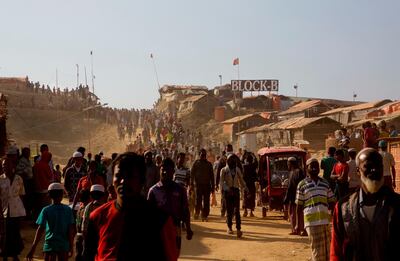For Mohammed Zobair, all that stretches ahead is uncertainty. He is worried about the future, his friends, his family and his neighbours.
Mr Zobair is, like hundreds of thousands of others in Bangladesh's Kutupalong refugee camp, scared and helpless.
He has lived in the camp since 1992, when he was forced to flee Myanmar with his family as a boy.
His father was killed by the military and Mr Zobair has since lived in an area originally designed as temporary shelter.
There are now more than 600,000 Rohingya living in Kutupalong, one of two government-run refugee camps in Cox’s Bazar.
Makeshift huts of tarpaulin and bamboo stretch for miles. There is a shortage of food and medicine. Children have no education and each day is a struggle.
And they are now faced with perhaps their greatest threat: the Covid-19 pandemic.
There have been no confirmed cases in the camp but one infection has been recorded in a nearby community.
It has raised fears of an outbreak in Kutupalong which, given the population density – more than 40,000 people for each square kilometre – and shortage of medical supplies could prove devastating.
The camp has been placed in lockdown, a drastic measure but one that was considered unavoidable.
There is no room to isolate oneself or for quarantine. The effect of an outbreak in Kutupalong is unthinkable.
"If one person gets infected in the future, what will we do? We will all die in silence," Mr Zobair told The National.
“We feel useless in the world. There is no peace, no happiness, no entertainment.
"My parents’ lives ended here, my life will end here and the next generation’s life will end here. Most people have no hope here.”
For Mr Zobair and his fellow Kutupalong residents, everything has changed. The mosques, once full, are empty. Children who played on the streets are now confined to their huts.
The markets, so often bustling with activity, are quiet, and some stalls forced to close.
“There is a lack of food, a lack of treatment, medicine, a lack of freedom,” Mr Zobair said. “There is a lack of everything. We need more help.”
Houses in Kutupalong are small and some are shared by as many as 12 people. It makes social distancing almost impossible.
Hygiene has become even more of a concern. There is not enough running water for everyone to wash their hands or to meet basic needs.
In Kutupalong, there is a dependency on organisations and aid groups to provide support. But it is often difficult, in a camp so large, to convey information effectively.
Few residents have internet access, so many are left uninformed. This has led to confusion.
“Markets are still open. People are not maintaining social distance,” said Noor Hossain, another camp resident. “I am very worried.”
She is not alone. Prof Azeem Ibrahim, author of 2016 book The Rohingyas: Inside Myanmar's Hidden Genocide, has emphasised the importance of preventing an outbreak.
“In conditions such as those in which the Rohingya are living, containing the disease once it appears will be virtually impossible,” Prof Ibrahim said.
“If it does make its way into the camp, all hell will break loose.
"We have seen from the experience of Europe that even countries such as Italy and Spain, with advanced healthcare systems, can be quickly overrun with catastrophic consequences.”
He said a Covid-19 outbreak could kill as many as 20 per cent of Kutupalong’s population.
“After all that they have gone through, the Rohingya are facing a killer even more deadly than the Myanmar military," Prof Ibrahim said.
Tension is high inside the camp. Families are forced to ration food and spend all day together in cramped spaces. It is a worrying time for everyone in Kutupalong.
On April 26, a fire broke out in the camp.
“At 4am I woke up and saw a lot of smoke,” Ms Hossain said. “I realised there was a massive fire in the market.”
Nobody was hurt but shops were burnt to the ground.
It only added to the stress. Only a few days into Ramadan, normally a time of joy, giving and spirituality, refugees in Kutupalong find themselves more restricted than ever.
Mr Zobair said he did not know when it would be over.
He does not know when he will be free to visit his mosque and spend time with friends.
He said he hoped one day to receive a scholarship and study abroad, to start a new life. For now, though, he is trapped.
“For you, maybe this is the first lockdown in your life,” Mr Zobair said. “But we have been in lockdown for a long, long time.”










